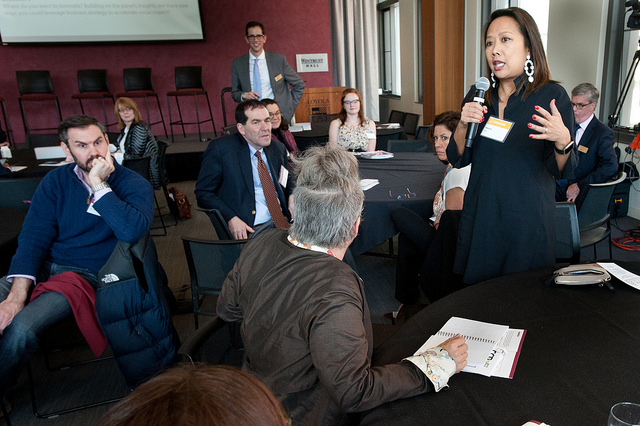Leading for Good

The following post includes expanded remarks from Cara President and CEO Maria Kim’s panel remarks at the Loyola University Chicago Quinlan School of Business Leading For Good panel on scale and social enterprises in March 2018:
As I reflected on an oldie but goodie REDF blog “Bigger is meh. Sustainability is sexy.”, I was reminded that the question of scale for social enterprises is often a tricky one. Here’s the thing: these businesses – often by design – are inherently inefficient. Unlike their private sector counterparts, social enterprises are not designed to maximize shareholder value, they are really designed to maximize dreamholder value. What I mean by that is that if you imagine the individuals we employ through our social enterprises [largely people affected by homelessness and poverty (and the many trappings that may go along with it – engagement with the justice system, recovery from addiction, recovery from abuse)] are the dreamholders, then you’ll understand our objective is to make sure their needs are served. And sometimes that runs counter-intuitive to running a smart business.
Here’s how:
1. For starters, we like inefficiency [like shoveling sidewalks with shovels instead of with ATVs] because that creates a lot of person hours; and many hours means much more practice building the skills our participants need to increase their marketability for more permanent employment. If the jobs are too efficient, our folks don’t get enough practice. If folks don’t get enough practice, they’re less ready for the outside workplace. If they’re less ready for the outside workplace, they’re less likely to stick and stay. And if they’re less likely to stick and stay, then we will not have moved the needle for that one person, and therefore that one family, in creating a new future through gainful employment.
2. We actually want people to make mistakes while they’re with us – mistakes in time management, in communication – because we can coach real-time as those mistakes happen, draw real-world implications from those mistakes to the consequences they have on the job and to our teammates, and we can ensure that if folks can grow from those mistakes right here, then our transitional jobs really do become a grand and productive dress rehearsal for permanent placement.
3. We weirdly love high churn – sometimes as high as 400% in one year. Our hope is that our employees actually do not stay with us over the long-term, but that they are able to move on to greater employment in the private sector. As a result, we have high turnover, but it’s good turnover – our top-performing candidates are soon plucked to move on to better jobs – jobs that are more permanent and are at a higher wage than the transitional job our social enterprise creates. All told, we have done our mission work, but not without consequences to the business.
Scaling up is critically important, but it’s also radically hard. For context, our social enterprises are Cleanslate – an exterior maintenance business and Cara Connects – a contract staffing company – with combined topline revenue of $4.5M and job production of about 450 transitional jobs per year. A couple of ideas on how we can scale beyond our incremental, organic growth that do come to mind:
• Subcontract. Often times our businesses can’t handle super large scale contracts, but we can be a tremendous subcontractor to a willing prime.
• Similarly, go sniff around where others are exiting and see what you can pick up. Our staffing firm, Cara Connects, is in conversation with a private firm about picking up clients they no longer want as they can’t make enough money in those verticals.
• Take high margin/low mission business, so you can bid more competitively on low margin/ high mission business.
These are a few of the many steps we can take to grow the top and bottom line, and thereby grow greater mission in the process. Not every decision has to be checking off equal parts mission and margin, but the more we stay attuned to the delicate balance between the two, and the inextricable relationship they have to each other and the larger social gains at work, the better we will be in our pursuit of transformational, not transactional employment, and in bigger and brighter horizons for all.
Maria Kim is the President and CEO of Cara. She holds an MBA from the Booth School of Business and serves on the boards of the EPIC Academy and Rebuilding Exchange. She fancies herself an expert solver of crimes due to her excessive consumption of “Law and Order” reruns.


